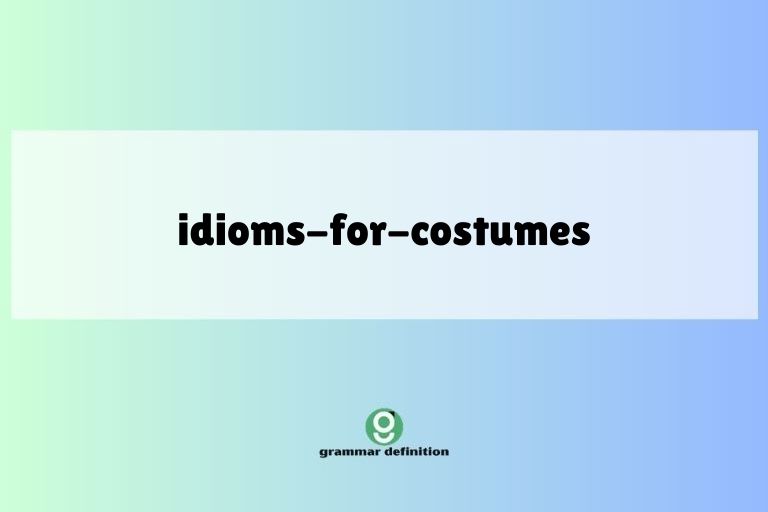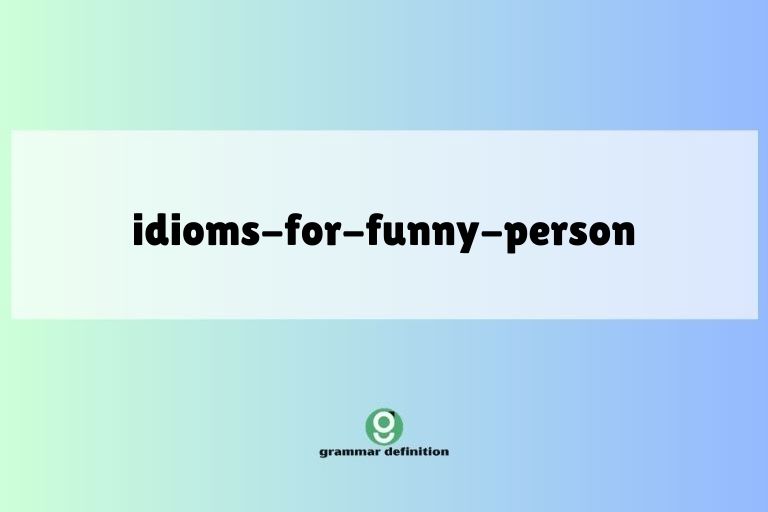Dressing the Part: Mastering Idioms for Costumes & Disguises

Idioms add color and depth to the English language, allowing us to express complex ideas in a concise and often humorous way. When discussing costumes and disguises, a rich array of idioms can bring our descriptions to life, making them more engaging and relatable.
Understanding these idioms not only enhances your vocabulary but also provides insight into the cultural nuances of the English language. This article will explore a variety of idioms related to costumes and disguises, providing definitions, examples, and practice exercises to help you master their usage.
Whether you’re an English language learner or a native speaker looking to refine your communication skills, this guide will equip you with the tools to confidently use these colorful expressions.
This guide is perfect for English language learners wanting to expand their vocabulary, creative writers looking to enrich their storytelling, and anyone interested in the playful side of the English language. By the end of this article, you’ll be able to confidently sprinkle these idioms into your conversations and writing, adding flair and personality to your descriptions of costumes and disguises.
Table of Contents
- Definition: Idioms for Costumes and Disguises
- Structural Breakdown of Costume Idioms
- Types and Categories of Costume Idioms
- Examples of Idioms for Costumes
- Usage Rules for Costume Idioms
- Common Mistakes When Using Costume Idioms
- Practice Exercises
- Advanced Topics in Costume Idioms
- Frequently Asked Questions
- Conclusion
Definition: Idioms for Costumes and Disguises
An idiom is a phrase or expression whose meaning cannot be understood from the literal meanings of the individual words. Instead, the phrase has a figurative meaning that is known through common use.
Idioms related to costumes and disguises use the imagery of clothing, masks, and roles to convey abstract concepts about appearance, identity, and behavior. These idioms often add a layer of nuance and cultural understanding to communication.
These idioms can be classified based on their function: some describe the act of concealing one’s true self, while others focus on the impression a costume creates. They can also relate to the act of pretending or playing a role, drawing parallels between theatrical performances and real-life situations.
The context in which these idioms are used is crucial for understanding their intended meaning. For example, “a wolf in sheep’s clothing” suggests deception, while “dressing the part” implies conforming to expectations.
Structural Breakdown of Costume Idioms
Costume idioms, like all idioms, are fixed expressions. This means that their structure is generally rigid, and changing the words can alter or destroy their meaning.
They often consist of a combination of nouns (e.g., “mask,” “clothing,” “disguise”), verbs (e.g., “wear,” “put on,” “take off”), and adjectives (e.g., “false,” “thin,” “new”). The arrangement of these elements contributes to the idiom’s overall figurative meaning.
The structure of these idioms can vary. Some are simple phrases, such as “undercover,” while others are more complex sentences, like “to wear your heart on your sleeve.” The grammatical structure is not as important as the established meaning.
Understanding the underlying metaphor is key to using these idioms correctly. For instance, the idiom “a cloak-and-dagger operation” uses the image of clandestine activities hidden by cloaks to describe a secret mission.
Types and Categories of Costume Idioms
Costume idioms can be categorized based on their underlying theme or the aspect of disguise and appearance they emphasize. Here are a few key categories:
Idioms of Concealment
These idioms focus on hiding one’s true identity, intentions, or feelings. They often involve metaphors of masks, veils, or disguises that obscure the truth.
Idioms of Deception
These idioms highlight the act of misleading others through appearances or false pretenses. They often carry a negative connotation, suggesting dishonesty or manipulation.
Idioms of Role-Playing
These idioms relate to the act of assuming a particular role or behavior, whether for a specific purpose or as a habitual pattern. They draw parallels between theatrical performances and real-life interactions.
Idioms of Conformity
These idioms emphasize the pressure to adhere to social norms or expectations, often through adopting a particular appearance or behavior. They can highlight the tension between authenticity and conformity.
Idioms of Revelation
These idioms describe the act of revealing one’s true identity or intentions, often after a period of concealment. They can signify a moment of honesty or a shift in behavior.
Examples of Idioms for Costumes
The following sections provide numerous examples of idioms related to costumes and disguises, categorized for clarity. Each example includes a definition and a sentence illustrating its usage.
General Costume Idioms
This section provides a wide range of general idioms related to costumes and appearances, covering various aspects of dressing up and presenting oneself.
The table below presents 30 examples of general costume idioms, their meanings, and example sentences demonstrating their usage.
| Idiom | Meaning | Example Sentence |
|---|---|---|
| Dress to kill | To dress in a very attractive or impressive way, intending to impress others. | She dressed to kill for her job interview, hoping to make a lasting impression. |
| All dressed up with nowhere to go | Prepared or dressed for an event that is canceled or does not happen. | After the party was canceled, I felt all dressed up with nowhere to go. |
| Hit the costume party | To attend a costume party. | We’re going to hit the costume party downtown on Saturday night. |
| In costume | Wearing a costume. | The actors were already in costume before the curtain rose. |
| A change of clothes | An extra set of clothing to change into. | I always pack a change of clothes when I go camping. |
| Cut from the same cloth | Very similar in character or nature. | The two politicians are cut from the same cloth; they both prioritize wealth over people. |
| Wear the pants | To be the dominant person in a relationship or household. | Everyone knows she wears the pants in that family. |
| Caught with your pants down | To be unprepared or caught in an embarrassing situation. | The company was caught with its pants down when the new regulations were announced. |
| Keep something up your sleeve | To have a secret plan or advantage. | He always keeps a few tricks up his sleeve in negotiations. |
| Roll up your sleeves | To prepare to work hard. | It’s time to roll up our sleeves and get this project finished. |
| Fit like a glove | To fit perfectly. | The dress fit her like a glove. |
| Too big for your boots | To be arrogant or overconfident. | He’s been acting too big for his boots since he got promoted. |
| Fill someone’s shoes | To take someone’s place and do their job as well as they did. | It’s going to be hard to fill her shoes after she retires. |
| In someone’s shoes | To be in someone else’s situation. | I wouldn’t want to be in his shoes right now. |
| Put yourself in someone’s shoes | To imagine yourself in someone else’s situation. | Try to put yourself in her shoes before you judge her. |
| Tighten your belt | To spend less money due to financial difficulties. | We’ll have to tighten our belts if we want to save for a house. |
| Below the belt | Unfair or cruel. | His comment was a bit below the belt. |
| A white-collar job | A professional office job. | He has a white-collar job in a law firm. |
| A blue-collar job | A manual labor job. | My father has always worked a blue-collar job in construction. |
| Golden parachute | A large payment or other financial compensation guaranteed to a company executive should the executive be dismissed as a result of a merger or takeover. | The CEO received a generous golden parachute when the company was acquired. |
| Have something in the bag | To have something secured or guaranteed. | With the contract signed, we have the deal in the bag. |
| Cheap suit | Something that is of poor quality, either literally a suit or metaphorically. | His argument was a cheap suit, full of holes and easily torn apart. |
| In the altogether | Naked | The baby was running around in the altogether, giggling with glee. |
| Sunday best | One’s best clothing, typically worn to church on Sundays. | She always wore her Sunday best to visit her grandmother. |
| Dressed to the nines | Dressed very elegantly and stylishly. | They were dressed to the nines for the gala. |
| A feather in one’s cap | An achievement to be proud of. | Winning the award was a feather in her cap. |
| Handle with kid gloves | To treat someone or something with extreme care and gentleness. | You have to handle fragile items with kid gloves. |
| Give the shirt off your back | To be extremely generous and willing to help others. | He’s the kind of person who would give you the shirt off his back. |
| Wear your heart on your sleeve | To openly display your emotions. | She wears her heart on her sleeve, so everyone knows how she’s feeling. |
| Take a leaf out of someone’s book | To imitate someone’s behavior or actions. | I’m going to take a leaf out of her book and start exercising regularly. |
Disguise-Related Idioms
This section focuses specifically on idioms that relate to disguises, concealment, and hidden identities. These idioms often involve metaphors of masks, veils, and other forms of concealment.
The table below contains 25 examples of disguise-related idioms, with their definitions and example sentences that illustrate their usage in context.
| Idiom | Meaning | Example Sentence |
|---|---|---|
| A wolf in sheep’s clothing | Someone who appears harmless but is actually dangerous or evil. | Beware of him; he’s a wolf in sheep’s clothing. |
| Undercover | Working secretly to gather information, often as a police officer. | The detective was working undercover to catch the criminals. |
| Mask your feelings | To hide your true emotions. | She tried to mask her feelings of disappointment with a smile. |
| Behind a mask | Hiding one’s true self or intentions. | He lived behind a mask of confidence, but inside he was insecure. |
| Take off the mask | To reveal one’s true self or intentions. | It’s time to take off the mask and be honest with yourself. |
| Cloak-and-dagger | Involving secrecy, espionage, and intrigue. | The negotiations were conducted in a cloak-and-dagger fashion. |
| Hidden agenda | A secret or ulterior motive. | I suspect he has a hidden agenda for supporting this project. |
| Keep under wraps | To keep something secret or confidential. | The details of the agreement are being kept under wraps. |
| A skeleton in the closet | A shameful or embarrassing secret from the past. | Every family has a skeleton in the closet. |
| Sweep under the rug | To ignore or conceal something, especially a mistake or problem. | They tried to sweep the scandal under the rug, but it was too late. |
| Play your cards close to your chest | To keep your plans and intentions secret. | He plays his cards close to his chest, so it’s hard to know what he’s thinking. |
| A Trojan horse | Something that appears harmless but is actually a trick or deception. | The new software was a Trojan horse, designed to steal our data. |
| In disguise | Having an appearance that is different from normal, especially in order not to be recognized. | The celebrity traveled in disguise to avoid being mobbed by fans. |
| Put on an act | To pretend to be someone you are not. | He was just putting on an act to impress her. |
| False pretenses | Misleading or deceptive behavior. | He obtained the money under false pretenses. |
| Cover your tracks | To hide or conceal evidence of your actions. | The criminals tried to cover their tracks, but the police found them anyway. |
| Paper over the cracks | To conceal problems or weaknesses without really solving them. | They’re just papering over the cracks in the system. |
| Keep a low profile | To avoid attracting attention. | After the scandal, he decided to keep a low profile. |
| Behind closed doors | In private or secretly. | The negotiations took place behind closed doors. |
| Pull the wool over someone’s eyes | To deceive or trick someone. | He tried to pull the wool over my eyes, but I saw through his lies. |
| Under the table | Secretly or illegally. | They were paying him under the table to avoid taxes. |
| Camouflage | To hide or disguise something. | The soldiers used camouflage to blend in with their surroundings. |
| A smokescreen | Something intended to disguise or conceal a situation. | The company’s announcement was just a smokescreen to hide their financial problems. |
| Two-faced | Insincere or hypocritical. | I don’t trust her; she’s very two-faced. |
| With a grain of salt | To not take something too seriously or literally. | Take his advice with a grain of salt; he’s not always right. |
Acting and Role-Playing Idioms
This section includes idioms that relate to the act of pretending, performing, or assuming a role, often drawing parallels between theatrical performances and real-life situations.
The table below features 20 examples of acting and role-playing idioms, along with their meanings and illustrative example sentences.
| Idiom | Meaning | Example Sentence |
|---|---|---|
| Put on a show | To create a false or deceptive display. | He was just putting on a show for the cameras. |
| Play a part | To act a role in a play or in real life. | She played the part of the grieving widow convincingly. |
| Act the fool | To behave in a silly or foolish way. | He was just acting the fool to make us laugh. |
| Play along | To pretend to agree with someone or something. | I decided to play along with his story to see where it would lead. |
| Steal the show | To attract the most attention and praise. | The young actress stole the show with her performance. |
| A tough act to follow | A performance or achievement that is difficult to surpass. | His success will be a tough act to follow. |
| Waiting in the wings | Ready to take over or step in when needed. | There are several candidates waiting in the wings for the job. |
| Behind the scenes | In a private or non-public setting. | A lot of work goes on behind the scenes to make the event a success. |
| Curtain call | The final bow at the end of a performance. | The actors received a standing ovation during their curtain call. |
| Read your lines | To say the words written in a script. | The actors need to read their lines more clearly. |
| Off script | Deviating from a prepared script or plan. | He went off script during the presentation and started improvising. |
| On cue | At the correct moment or signal. | The actor delivered his line perfectly on cue. |
| Stage presence | The ability to command attention on stage. | She has a natural stage presence that captivates the audience. |
| Break a leg | A phrase used to wish someone good luck, especially before a performance. | “Break a leg!” I said to my friend before her audition. |
| In character | Behaving like the character one is portraying. | He remained in character even after the scene ended. |
| Out of character | Not behaving like one normally does. | His behavior at the party was completely out of character. |
| The show must go on | An event or performance must continue despite problems or difficulties. | Despite the rain, the show must go on. |
| Upstage someone | To draw attention away from someone else. | He didn’t mean to upstage her, but his joke was funnier. |
| A hard act | Something difficult to emulate | His performance was a hard act. |
| All the world’s a stage | Life is a performance and people are merely actors. | As Shakespeare wrote, all the world’s a stage. |
Idioms About Revealing True Identity
These idioms focus on the act of revealing one’s true identity or intentions, often after a period of concealment or pretense. They can signify a moment of honesty, vulnerability, or a shift in behavior.
Below is a table with 20 idioms about revealing true identity, along with their definitions and corresponding example sentences.
| Idiom | Meaning | Example Sentence |
|---|---|---|
| Show your true colors | To reveal your real personality or character, especially when it is negative. | He finally showed his true colors when he betrayed his friends. |
| Come clean | To confess or admit something, especially something that has been kept secret. | He decided to come clean about his past mistakes. |
| Let your guard down | To relax and stop being cautious or defensive. | She finally let her guard down and started to trust him. |
| Lay your cards on the table | To be honest and open about your intentions or plans. | It’s time to lay our cards on the table and discuss our goals. |
| Spill the beans | To reveal a secret or confidential information. | She accidentally spilled the beans about the surprise party. |
| The cat’s out of the bag | A secret has been revealed. | The cat’s out of the bag now that everyone knows about the promotion. |
| Open up | To become more communicative and share your feelings. | He started to open up about his childhood experiences. |
| Take someone into your confidence | To share a secret with someone you trust. | She took me into her confidence and told me her deepest fears. |
| Wear your heart on your sleeve | To openly display your emotions. | She wears her heart on her sleeve, so everyone knows how she’s feeling. |
| Bare your soul | To reveal your innermost thoughts and feelings. | He bared his soul in his autobiography. |
| Get something off your chest | To express something that has been bothering you. | I need to get something off my chest; I’ve been feeling guilty. |
| Unburden yourself | To relieve yourself of a worry or problem by talking about it. | She unburdened herself to her therapist. |
| Come out of your shell | To become more outgoing and sociable. | He started to come out of his shell after joining the club. |
| Break down walls | To overcome barriers and establish connections. | We need to break down walls and work together as a team. |
| Drop the pretense | To stop pretending and be genuine. | It’s time to drop the pretense and be honest with each other. |
| Level with someone | To be honest and straightforward with someone. | I need to level with you; I’m not happy with your performance. |
| Give it to someone straight | To tell someone the truth directly, even if it’s unpleasant. | I’m going to give it to him straight; he needs to improve his attitude. |
| Be upfront | To be honest and straightforward from the beginning. | It’s important to be upfront about your expectations. |
| Let your freak flag fly | Openly express your eccentricities or individuality. | At the festival, everyone was encouraged to let their freak flag fly. |
| Speak your mind | To say what you think, even if it’s unpopular. | Don’t be afraid to speak your mind; your opinion matters. |
Idioms About Costume Fit
This section presents idioms that relate to how well a costume or clothing fits, both literally and figuratively. These idioms can also extend to describing how well something suits a person or situation.
The table below lists 10 idioms about costume fit, providing their meanings and example sentences to illustrate their use.
| Idiom | Meaning | Example Sentence |
|---|---|---|
| Fit like a glove | To fit perfectly. | The dress fit her like a glove. |
| Too big for your boots | To be arrogant or overconfident. | He’s been acting too big for his boots since he got promoted. |
| Fill someone’s shoes | To take someone’s place and do their job as well as they did. | It’s going to be hard to fill her shoes after she retires. |
| In someone’s shoes | To be in someone else’s situation. | I wouldn’t want to be in his shoes right now. |
| Put yourself in someone’s shoes | To imagine yourself in someone else’s situation. | Try to put yourself in her shoes before you judge her. |
| Wear many hats | To have many different roles or responsibilities. | As a small business owner, she wears many hats. |
| If the shoe fits | If a remark or situation applies to you, accept it. | “If the shoe fits, wear it,” she said after criticizing his behavior. |
| Cut your coat according to your cloth | To live within your means. | We had to cut our coat according to our cloth and scale back our vacation plans. |
| Hand-me-down | Something, especially clothing, that has been passed down from one person to another. | The jacket was a hand-me-down from his older brother. |
| A perfect fit | Something that is ideally suited or matched. | Her skills and experience make her a perfect fit for the job. |
Usage Rules for Costume Idioms
Using idioms correctly requires understanding their figurative meanings and the contexts in which they are appropriate. Here are some key rules to follow:
- Understand the Meaning: Make sure you fully understand the idiom’s figurative meaning before using it. Using an idiom incorrectly can lead to confusion or miscommunication.
- Consider the Context: Idioms are often informal and may not be suitable for all situations. Consider the tone and audience before using an idiom.
- Avoid Literal Interpretation: Remember that idioms are not meant to be taken literally. Focus on the overall meaning of the phrase, not the individual words.
- Use Correctly: Some idioms have specific grammatical structures that must be followed. Pay attention to prepositions, verb tenses, and word order.
- Don’t Overuse: While idioms can add color to your language, overuse can make your writing or speech sound unnatural or forced.
It’s also important to be aware of regional variations. Some idioms may be more common in certain dialects or regions of English.
Be mindful of your audience and choose idioms that are widely understood. For example, an idiom common in British English might not be as familiar to an American audience.
Common Mistakes When Using Costume Idioms
One of the most common mistakes is taking idioms literally. For example, someone might misinterpret “a wolf in sheep’s clothing” as simply referring to an animal dressed up, rather than understanding its meaning of hidden danger.
Another mistake is altering the wording of an idiom. Idioms are fixed expressions, and changing the words can make them nonsensical.
Here are some examples of common mistakes and their corrections:
| Incorrect | Correct | Explanation |
|---|---|---|
| He showed his real colors yesterday. | He showed his true colors yesterday. | The correct idiom is “true colors,” not “real colors.” |
| She spilled the bottles about the party. | She spilled the beans about the party. | The correct idiom is “spill the beans,” not “spill the bottles.” |
| He was caught with his trousers down. | He was caught with his pants down. | While “trousers” is acceptable in British English, “pants” is more common in American English. The meaning remains the same. |
| I am putting myself in his shoes. | I am putting myself in his shoes. | This idiom is correct. |
| It fits like a hand. | It fits like a glove. | The correct idiom is “fits like a glove.” |
Another mistake is using an idiom in an inappropriate context. For instance, using a highly informal idiom in a formal presentation can undermine your credibility.
Always consider your audience and the overall tone of your communication.
Practice Exercises
Test your understanding of costume idioms with the following exercises. Fill in the blanks with the appropriate idiom from the list provided.
Idiom List: dress to kill, caught with your pants down, keep something up your sleeve, fit like a glove, a wolf in sheep’s clothing, under wraps, spill the beans, show your true colors, wear your heart on your sleeve, behind the scenes
- She always __________ when she goes out on a date.
- The company was __________ when the new regulations were announced.
- He likes to __________ in case he needs it later.
- The new software __________ on my computer.
- He seemed friendly at first, but he turned out to be __________.
- The details of the project are being kept __________.
- She accidentally __________ about the surprise party.
- He finally __________ when he betrayed his friends.
- She __________ , so everyone knows how she’s feeling.
- A lot of work goes on __________ to make the event a success.
Answer Key:
- dress to kill
- caught with your pants down
- keep something up your sleeve
- fit like a glove
- a wolf in sheep’s clothing
- under wraps
- spilled the beans
- showed his true colors
- wears her heart on her sleeve
- behind the scenes
Exercise 2: Choose the correct idiom to complete each sentence from the options provided.
- He tried to __________ (pull the wool over my eyes / sweep under the rug) , but I saw through his lies.
- She decided to __________ (come clean / keep a low profile) about her past mistakes.
- It’s time to __________ (lay our cards on the table / play your cards close to your chest) and discuss our goals.
- The actors received a standing ovation during their __________ (curtain call / dress rehearsal).
- He’s been acting __________ (too big for his boots / in someone’s shoes) since he got promoted.
- We had to __________ (tighten our belts / wear many hats) if we wanted to save for a house.
- She’s the kind of person who would __________ (give you the shirt off her back / keep something up her sleeve).
- They’re just __________ (papering over the cracks / showing their true colors) in the system.
- After the scandal, he decided to __________ (keep a low profile / put on an act).
- The new software was a __________ (Trojan horse / golden parachute), designed to steal our data.
Answer Key:
- pull the wool over my eyes
- come clean
- lay our cards on the table
- curtain call
- too big for his boots
- tighten our belts
- give you the shirt off her back
- papering over the cracks
- keep a low profile
- Trojan horse
Advanced Topics in Costume Idioms
At an advanced level, learners can explore the etymology and historical context of costume idioms. Understanding the origins of these phrases can provide deeper insights into their meanings and cultural significance.
For example, the idiom “caught with your pants down” has roots in historical situations where being unprepared could lead to vulnerability. Researching the historical usage of idioms can add a layer of sophistication to your understanding.
Another advanced topic is the use of idioms in literature and rhetoric. Authors often use idioms to create vivid imagery, develop characters, and convey themes.
Analyzing how idioms are used in different literary genres can enhance your reading comprehension and critical thinking skills. Furthermore, understanding the nuances of idiom usage can improve your ability to use language persuasively in speeches and debates.
Frequently Asked Questions
-
What is the difference between an idiom and a metaphor?
An idiom is a phrase whose meaning is different from the literal meaning of its words, relying on cultural context for understanding. A metaphor is a figure of speech that directly compares two unrelated things to highlight a similarity, creating a more vivid image or conveying a deeper meaning.
-
How can I improve my understanding of idioms?
Immerse yourself in the language through reading, listening, and speaking. Pay attention to how native speakers use idioms in different contexts. Keep a notebook of new idioms you encounter, along with their meanings and example sentences. Practice using them in your own writing and conversations.
-
Are idioms universal, or do they vary by culture?
Idioms are highly culture-specific and vary significantly across languages and regions. What might be a common idiom in one culture could be completely nonsensical in another. Understanding the cultural context is crucial for interpreting and using idioms correctly.
-
Can I create my own idioms?
While it’s technically possible to create new phrases, they would not be considered true idioms until they gain widespread use and acceptance within a language community. Idioms evolve organically over time through common usage.
-
How do I know when to use an idiom in my writing?
Consider your audience, the tone of your writing, and the overall message you want to convey. Idioms are generally more appropriate in informal or creative writing than in formal or technical contexts. Use them sparingly to add color and emphasis, but avoid overuse, which can make your writing sound unnatural.
Conclusion
Mastering idioms related to costumes and disguises can greatly enhance your understanding and use of the English language. These colorful expressions add depth, nuance, and cultural insight to your communication.
By understanding the definitions, usage rules, and common mistakes associated with these idioms, you can confidently incorporate them into your conversations and writing. Whether you’re describing a character in a novel, discussing a historical event, or simply adding flair to your everyday speech, these idioms will help you express yourself more vividly and engagingly.
So go ahead, dress the part, and let your language skills shine!






